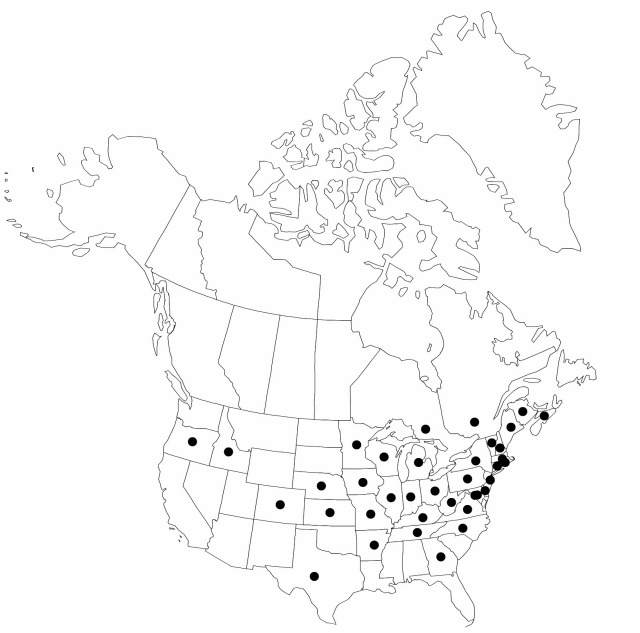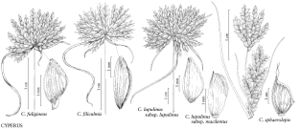Cyperus lupulinus
Trans. Wisconsin Acad. Sci. 62: 271. 1974.
Herbs, perennial, cespitose, bases cormose; rhizomes knotted, beaded. Culms trigonous, (3–)10–50 cm × 0.4–1.2 mm, glabrous. Leaves flat, 5–40 cm × 1–3.5 mm. Inflorescences: spikes rather densely ovoid to globose, 1.2–3.5 cm; rays 0 or 1–4, 1–6 cm; rachis 1–3.5 mm; bracts 2–4, horizontal to reflexed, flat, 6–25 cm; rachilla ± deciduous, wingless. Spikelets 15–60, compressed, oblong-lanceoloid, (3–)6–22 × 2.5–4 mm; floral scales deciduous, 5–22, off-white to light reddish brown, laterally 3–5-ribbed, ovate-elliptic, 2.5–4 × 2–2.6 mm, margins loosely spreading or clasping achene, apex entire to mucronate, mucro 0.05–0.2 mm. Flowers: anthers 0.3–0.6 mm; styles 1 mm; stigmas 1–1.5 mm. Achenes dark brown or black, sessile, oblong-ellipsoid to ellipsoid, 1.7–2.2 × 0.8–1.2 mm, apex obtuse, apiculate, surfaces puncticulate. 2n = 166.
Distribution

North America.
Discussion
Subspecies 2 (2 in the flora).
Cyperus lupulinus was studied in detail (B. G. Marcks 1974). Ranges of the two subspecies overlap somewhat. Cyperus lupulinus subsp. lupulinus is found chiefly in the Great Plains, and subsp. macilentus is centered in the Northeast. It is seldom difficult to assign specimens to subspecies.
The hybrid of Cyperus lupulinus with C. schweinitzii is C. ×mesochorus Geise. It is occasionally encountered with the two parent species in the north-central states (Illinois, Indiana, Michigan, Minnesota, and Wisconsin) and has been recorded once from Quebec. The hybrid is similar in size to C. schweinitzii; it has fewer rays, inflorescence bracts 30–45º above horizontal, and floral scales with mucros 0.4–0.5 mm.
Selected References
None.
Key
| 1 | Floral scales 2.5–4 mm, margins not clasping achene; spikelets with 5–22 floral scales. | Cyperus lupulinus subsp. lupulinus |
| 1 | Floral scales 1.8–2.5 mm, margins tightly clasping achene; spikelets with 3–7 floral scales. | Cyperus lupulinus subsp. macilentus |
